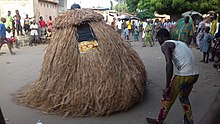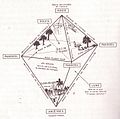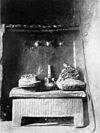Introduction The beliefs and practices of African people are highly diverse, including various ethnic religions. Generally, these traditions are oral rather than scriptural and are passed down from one generation to another through folk tales, songs, and festivals, and include beliefs in spirits and higher and lower gods, sometimes including a supreme being, as well as the veneration of the dead, and use of magic and traditional African medicine. Most religions can be described as animistic with various polytheistic and pantheistic aspects. The role of humanity is generally seen as one of harmonizing nature with the supernatural. ( Full article...) Selected articleThe Dahomean religion was practiced by the Fon people of the Dahomey Kingdom. The kingdom existed until 1898 in what is now the country of Benin. Slaves taken from Dahomey to the Caribbean used elements of the religion to form Vodou and other religions of the Afro-Caribbean diaspora. Selected imagesFestivalsThere are several religious festivals found in the various Traditional African religions. Some of these are listed below next to their corresponding religion :
Selected biography
Soumaoro Kanté (var.: Sumanguru Kanté) was a 13th-century king of the
Sosso people. Seizing
Koumbi Saleh, the capital of the recently defunct
Ghana Empire, Soumaoro Kanté proceeded to conquer several neighboring states, including the
Mandinka people in what is now
Mali. However, the Mandinka prince
Sundiata Keita built a coalition of smaller kingdoms to oppose him at the
Battle of Kirina (c. 1235), defeating the Sosso and leaving Sundiata's new
Mali Empire dominant in the region.
Soumaoro Kanté is portrayed as a villainous sorcerer-king in the national epic of Mali, the Epic of Sundiata. Selected quote
Source:
Diouf, Babacar Sédikh, Le Sérère, Paganism Polythéiste ou Religion Monothéiste [in] Camara, Fatou Kiné (PhD) & Seck, Abdourahmane (PhD), "Secularity and Freedom of Religion in Senegal: Between a Constitutional Rock and a Hard Reality", p 860-61 (PDF - p. 2-3)
[1]
Did you know
Related portalsTopicsFor more Traditional African religion topics, see
Category:Traditional African religions.
CategoriesWikiProjectsThings you can doAssociated WikimediaThe following Wikimedia Foundation sister projects provide more on this subject:
Discover Wikipedia using
portals |
Introduction The beliefs and practices of African people are highly diverse, including various ethnic religions. Generally, these traditions are oral rather than scriptural and are passed down from one generation to another through folk tales, songs, and festivals, and include beliefs in spirits and higher and lower gods, sometimes including a supreme being, as well as the veneration of the dead, and use of magic and traditional African medicine. Most religions can be described as animistic with various polytheistic and pantheistic aspects. The role of humanity is generally seen as one of harmonizing nature with the supernatural. ( Full article...) Selected articleThe Dahomean religion was practiced by the Fon people of the Dahomey Kingdom. The kingdom existed until 1898 in what is now the country of Benin. Slaves taken from Dahomey to the Caribbean used elements of the religion to form Vodou and other religions of the Afro-Caribbean diaspora. Selected imagesFestivalsThere are several religious festivals found in the various Traditional African religions. Some of these are listed below next to their corresponding religion :
Selected biography
Soumaoro Kanté (var.: Sumanguru Kanté) was a 13th-century king of the
Sosso people. Seizing
Koumbi Saleh, the capital of the recently defunct
Ghana Empire, Soumaoro Kanté proceeded to conquer several neighboring states, including the
Mandinka people in what is now
Mali. However, the Mandinka prince
Sundiata Keita built a coalition of smaller kingdoms to oppose him at the
Battle of Kirina (c. 1235), defeating the Sosso and leaving Sundiata's new
Mali Empire dominant in the region.
Soumaoro Kanté is portrayed as a villainous sorcerer-king in the national epic of Mali, the Epic of Sundiata. Selected quote
Source:
Diouf, Babacar Sédikh, Le Sérère, Paganism Polythéiste ou Religion Monothéiste [in] Camara, Fatou Kiné (PhD) & Seck, Abdourahmane (PhD), "Secularity and Freedom of Religion in Senegal: Between a Constitutional Rock and a Hard Reality", p 860-61 (PDF - p. 2-3)
[1]
Did you know
Related portalsTopicsFor more Traditional African religion topics, see
Category:Traditional African religions.
CategoriesWikiProjectsThings you can doAssociated WikimediaThe following Wikimedia Foundation sister projects provide more on this subject:
Discover Wikipedia using
portals |





































